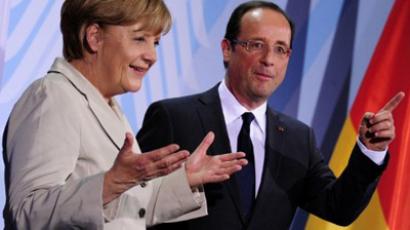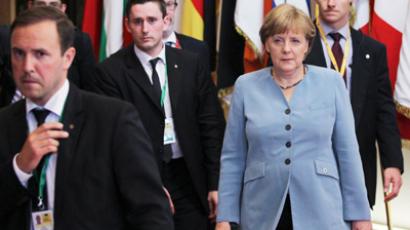Measuring Russia’s 'synergy' with France and Germany
The turmoil in Syria has become the main focus for the Russian president meeting his French counterpart, Francois Hollande, in Paris. Vladimir Putin also talked about economic ties with the Eurozone’s two biggest economies.
Paris was Vladimir Putin’s final stop on his first European tour since returning to the top job last month. Earlier on Friday, in Berlin, after a meeting with German Chancellor Angela Merkel, he vowed to do what he can to prevent Syria from sliding into civil war, and insisted Russia is not taking sides – the statements he reaffirmed in Paris.Apart from the Syrian crisis, the leaders discussed the economic situation and Europe and Russia’s economic co-operation with Germany and France. At a press conference in Paris, answering a question from a Russian journalist, Putin pointed out that both France and Germany are Russia’s strategic partners, and asking which one is more important for Moscow is “incorrect and provocative.”He noticed, however, that the scales of bilateral trade with France and Germany are very different.“The turnover with France amounts to US $28 billion, with Germany – US $72 billion. Can you feel the difference?” he questioned, adding that in 2011 alone, Russia invested as much as US $5.6 billion in Germany and only US $140 million in France. This proves, Putin concluded, that the level of economic co-operation between Paris and Moscow does not match its potential. With that said, he praised the direction the two countries have taken for developing further contacts in the real sector, including the nuclear industry, space and aviation.“We co-operate in the sphere of electric power industry, Мы сотрудничаем и в области электроэнергетики, carbohydrates – where French firms work on our territory and are ready to work with us on the territories of third countries,” the Russian president said. “We co-operate in aviation, where the French participate in the development of two good planes – a medium-range and a short-haul. In space – we have 14 launches planned for the next 15 years from [French] Guiana.”Researcher and author F. William Engdahl believes that Russia and Germany have more “economic synergy” that helps the two countries build their relations more successfully than in the case of Russo-French ties. France’s new president, however, may be able to open new perspectives here, Engdahl suggests.“Russia is vital for the EU, especially for Germany – not only historically, despite WWII. But Russia and Germany have a kind of economic synergy that fits quite well together and quite positively,” he told RT. “Germany exports the machine tools, the high value-added technology that Russia needs to rebuild its infrastructure, or to build its infrastructure. Russia has at the moment the raw materials and also the scientific know-how that is a world-class.”Speaking of France, however, the researcher noted that the country’s past policy towards Russia was a lot more far-sighted, while today, a large portion of that synergy has been lost. Nonetheless, Hollande in office maybe a good news for the two country’s bilateral relations and co-operation.“One of the things that Hollande might bring in that Sarkozy did not – Sarkozy [unlike Hollande] was very, very close to the American agenda in terms of military intervention in Libya and Syria, and other places,” he said.As for now, F. William Engdahl said, it would be premature to speculate on how much Hollande and his government will be willing to play Washington’s games, or, perhaps, they are looking for a more neutral stance.














